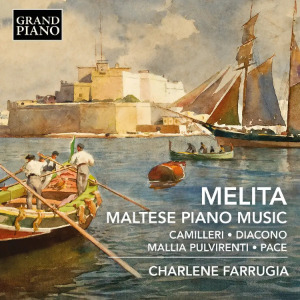
Melita: Maltese Piano Music
Charlene Farrugia (piano)
rec. 2023, Concert Hall, Lisztzentrum, Raiding, Austria
Grand Piano GP949 [73]
Confucius famously opined that the greatest curse was to ‘live in interesting times’; running a close second to that could be to live in a strategically interesting place. Malta, found closer to North Africa than mainland Europe, though tiny – London is five times bigger – is one such place, as history shows through it being invaded and conquered over the millennia by first, Phoenicians, followed by Carthaginians, Romans, Arabs (9th-11th centuries), Normans, Aragonese, the Catholic Knights Hospitalier (expelled by the Ottomans) and lastly the Protestant British. The Arabs left linguistic traces which remain and for several centuries influenced the island’s religious practices. It is reasonable to assume that its position has also had an influence on its culture, including its music. A minimum amount of research shows the names of twenty-two composers, the earliest born in 1616, and doubtless there are more. That’s more than impressive for such a small place. The fact that of the fifteen tracks on this disc only the six comprising Camilleri’s African Dreams have been recorded before indicates that the music of Malta has been unjustifiably neglected, making it a valuable contribution to our collective knowledge.
Ateş Orga has written the extremely thorough and helpful notes and he explains the complex musical personality that was Charles Camilleri, whose music was a synthesis of so many distinct styles. Camilleri himself said that for him his music was based on the four ‘elements’ which comprise ‘the whole world: the Orientally meditative, African ritualism, Jazz and European rationalism’ However, he explained that rather than directly copy them he took their aura, turned them into an abstract form, then chose to ‘make an abstract out of the abstract’. There is no doubt that his African Dreams is a fascinating work with those distinct elements making their presence felt. The opening section Hymn to Morning is deceptively calm, with a delightful melody bringing the music of Louis Moreau Gottschalk to mind. This opening perhaps suggests to the listener the kind of music they can expect to hear throughout, but nothing could be further from what follows, as Rain Forest Fantasy is a relentlessly pounding set of rhythms that paints a vivid picture of teeming rain soaking the forest. Calm is restored in Experience of Conflict, though the rhythm is fragmented rather than fluid. Festival Drumming is Messianic, in concept with spiky rhythms peppered throughout its brief appearance. Children’s Lagoon restores the gentle nature of the first and third pictures and to close, A Dance: Ritual Celebration falls between two moods, and I shall quote Ateş Orga, whose description is way more incisive than mine could match. He says that it opens ‘Vigoroso, echoing ‘Festival Drumming’ (and) Allegro molto vivace, exploding in a virtuosic amalgam of cross-rhythms, ‘white’ pentatonic octaves, ‘black/white’ boogie, and gasping semiquaver crushes chromatically hued’. The jazz influence certainly exerts itself in the closing notes reflecting some of the opening material from Hymn to Morning as it does.
It is sad to read that Carmelo Pace, ‘the most versatile and prolific native musical talent Malta has known’ (Joseph Vella Bondin ‘Carmelo Pace: A life in music’ Sunday Times (Malta), 22 May 1994), is hardly known, and whose sizeable output of over 500 scores remain largely unpublished. He was the first composer to show an interest in Maltese folk music, known as għana in the Maltese language. His second piano sonata was written as a single-movement work, as was his custom, yet contains many changes of mood and pace which explains why, in the booklet, it is shown as being in three movements with six distinct sections. It is a complex work and its entry in the catalogue of his works, complied in collaboration with the composer, notes it as being ‘a work of brilliancy and of enormous difficulty’ which it certainly sounds to be.
In contrast to the virtuosic nature of Pace’s sonata, Carlo Diacono’s Fantasie-Impromptu is a work in a Chopinesque vein with long flowing lines that charm the ear. Next, we are treated to some more of Carmelo Pace with his Four Bagatelles, written in 1979. The first two are gentle, the third more upbeat and the fourth is a life-affirming force that is driven towards its conclusion with an affecting vigour.
This fascinating disc concludes with a transcription of one of the rare examples of Maltese symphonic work (hence its title Impressione Sinfonica), which never appears to have taken root in Malta. As a result, this work by Josie Mallia Pulvirenti is complex, full of orchestral flourishes, presenting a multitude of instruments, and is marked into no less than eighteen distinct sections. It is a highly impressive work.
One of my continuing joys in reviewing is the discovery of works and composers new to me and this disc reveals an area of the world whose music I was completely unaware of. Small though Malta may be, the natural desire for humans to make music has permeated every corner of the world and Malta is no exception. The music is individual with the subtlety of its geographical influences quite apparent and the experience of getting to know it was quite a thrill. Interpreting the music is Charlene Farrugia, an outstanding representative of Malta’s continuing musical talent whose love for, commitment to, and pride in her country’s musical heritage, is clearly on display throughout the disc and which adds an extra dimension to the experience. Lovers of piano music are in for a treat with so many discoveries this disc affords.
Steve Arloff
Buying this recording via a link below generates revenue for MWI, which helps the site remain free



Contents
Charles Camilleri (1931-2009)
African Dreams (1965)
Carmelo Pace (1906-1993)
Piano Sonata No.2 (1973)*
Carlo Diacono (1876-1942)
Fantasie-Impromptu (1928)*
Carmelo Pace
Four Bagatelles (1979)*
Josie Mallia Pulvirenti (1896-1964)
Impressione Sinfonica (version for piano) (1922)*
*First recording

















